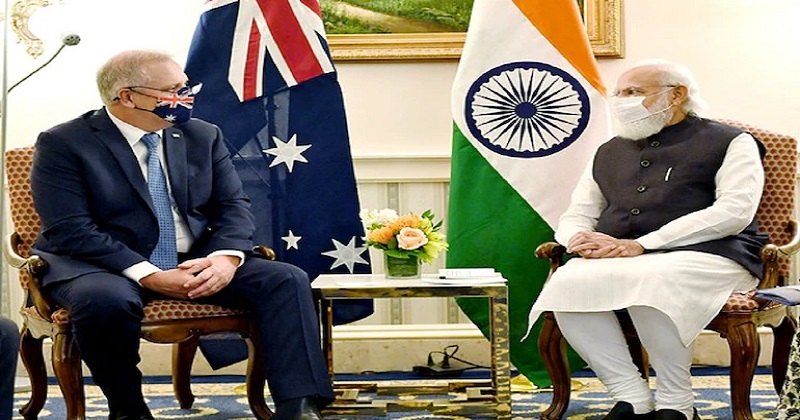
In a virtual summit between Prime Minister Narendra Modi and his Australian counterpart Scott Morrison, India and Australia launched a series of new initiatives pertaining to critical minerals, clean energy, student mobility, and tax advantages for sovereign fund investments. As the two sides pledged to reenergize their ties, including in the Indo-Pacific region, the Australian side announced an investment of around Rs 1,500 crore in certain key sectors.
The two strategic partners decided to establish a young officer exchange program as a means of boosting their military cooperation. They also announced the creation of a task force to determine whether their educational qualifications are the same. In December, the helicopter carrying Gen Bipin Rawat died in a crash. The exchange program has been named after him.
Both Modi and Morrison agreed that the proposed Comprehensive Economic Cooperation Agreement (CECA) should be concluded as soon as possible because of the importance of unlocking untapped bilateral trade and investment potential. Both sides announced that an annual summit mechanism would be established between the two countries so that a regular review of the relationship could be conducted.
In a media briefing, Harsh Vardhan Shringla said a memorandum of understanding (MoU) between Khanij Bidesh India Ltd (KABIL) and the Critical Minerals Facilitation Office will facilitate joint investments in mining projects in Australia.
In both countries, this is a key area. This agreement will give us the opportunity to gain Australian expertise in this field as well as to invest in Australia’s mineral sector. Australia has a significant supply of lithium, cobalt, and vanadium, which are crucial for the manufacture of critical electronic components, and India is looking to boost cooperation with them. The two sides also agreed on a letter of intent to work towards a migration and mobility partnership agreement.
The educational credentials were examined through a separate letter of arrangement. Prasar Bharati and Australia’s Special Broadcasting Service (SBS) have signed another MoU on broadcasting cooperation and collaboration. In his opening remarks, Modi noted that remarkable progress has been made on CECA in a short period of time.
Modi stated that in addition to good cooperation, Quad remains committed to a free, open, and inclusive Indo-Pacific. A strong Quad is vital to the region’s stability. Barry O’Farrell, Australian High Commissioner, stated earlier that the trade pact would be signed by the end of this month. In the last few years, relations between India and Pakistan have progressed significantly, Modi said.
The cooperation in trade and investment, defence and security, education and innovation, science and technology has strengthened in these areas as well as other ones, such as critical minerals, water management, renewable energy, and Covid-19 research, he said. The Australian government announced that Australia and India will set up a task force about qualifications recognition for two-way mobility between the two countries. The task force, announced by PM Scott Morrison and PM Narendra Modi, will deal with issues such as online and blended learning, joint degrees, and offshore campuses, it said.
According to acting minister for education Stuart Robert, the task force would consult with stakeholders to identify opportunities for the recognition of Australian and Indian higher education qualifications. It would also make recommendations based on best principles and practices for such recognition. Shringla said the two sides are also planning to enhance collaboration between India’s National Investment and Infrastructure Fund and Australia’s Future Fund, which is a sovereign wealth fund.
Modi lauded the announcement of the establishment of the Centre of Excellence for Critical and Emerging Technology Policy in Bengaluru. ‘We need better cooperation between us on cyber and critical and emerging technologies. Those countries that understand our values must adopt appropriate global standards in those fields,’ he said.

Post Your Comments